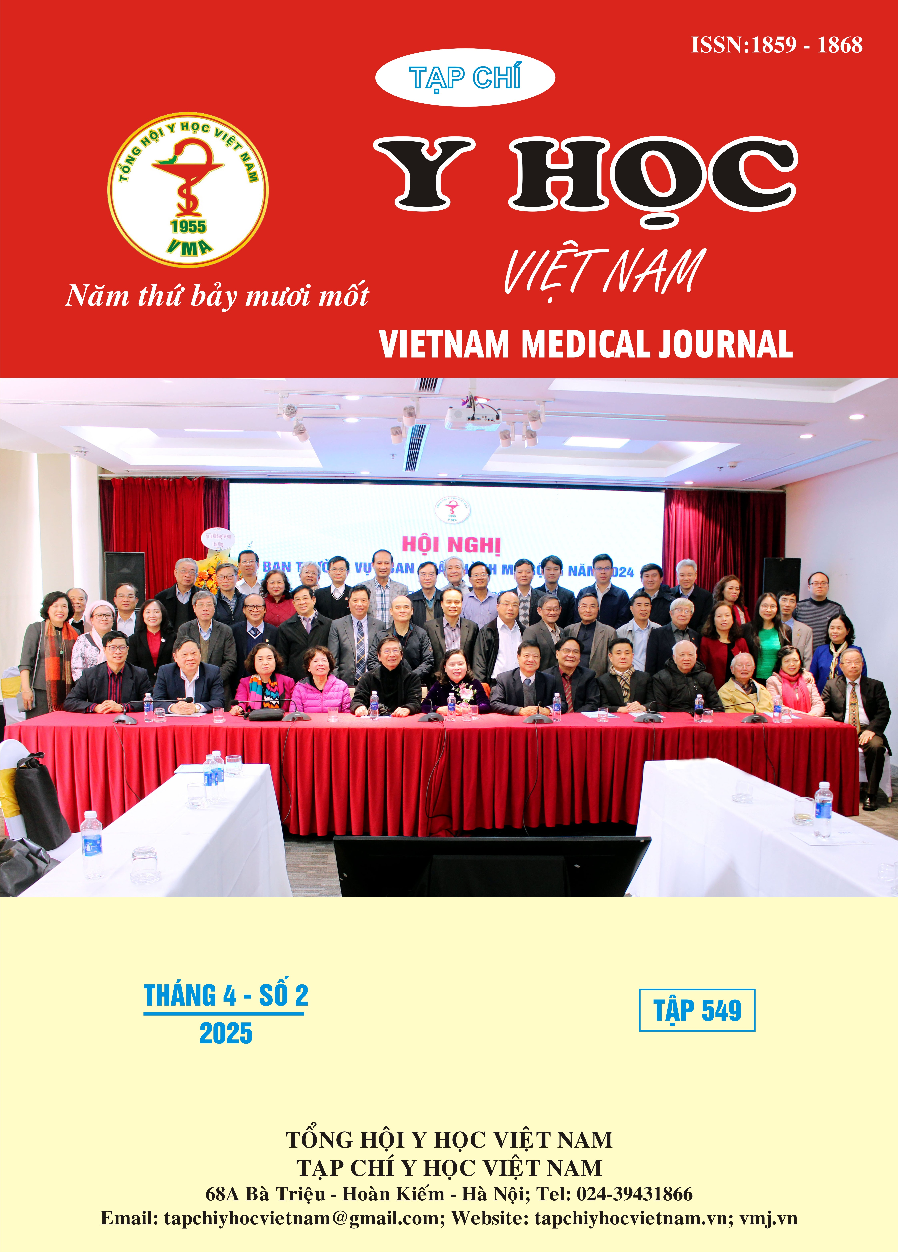HIỆU QUẢ LÀM DÀY NIÊM MẠC VÀ KẾT QUẢ CÓ THAI TRÊN BỆNH NHÂN SỬ DỤNG HUYẾT TƯƠNG GIÀU TIỂU CẦU TỰ THÂN TRONG CHUYỂN PHÔI ĐÔNG LẠNH
Nội dung chính của bài viết
Tóm tắt
Việc sử dụng huyết tương giàu tiểu cầu tự thân (PRP) đã trở thành phương pháp tối ưu cho những bệnh nhân có niêm mạc tử cung mỏng, với hiệu quả cao đã được thử nghiệm tại nhiều trung tâm thụ tinh ống nghiệm trong nước và quốc tế. Mục tiêu: Nghiên cứu này nhằm đánh giá hiệu quả của PRP tự thân trong việc làm dày niêm mạc tử cung và cải thiện kết quả có thai ở bệnh nhân chuyển phôi đông lạnh. Phương pháp nghiên cứu: Những bệnh nhân đủ tiêu chuẩn tham gia nghiên cứu sẽ được siêu âm qua ngả âm đạo vào ngày 2 hoặc 3 của chu kỳ kinh để đánh giá độ dày niêm mạc tử cung. Liều lượng nội tiết ngoại sinh phù hợp sẽ được sử dụng để chuẩn bị niêm mạc tử cung dựa trên các đặc điểm kích thích buồng trứng hoặc chu kỳ chuẩn bị niêm mạc trước đó. Huyết tương giàu tiểu cầu tự thân sẽ được bơm vào buồng tử cung một hoặc hai lần, bắt đầu từ ngày 10 của chu kỳ kinh và sự thay đổi độ dày niêm mạc tử cung sẽ được đánh giá sau 48-72 giờ. Kết quả chính của nghiên cứu là sự thay đổi độ dày niêm mạc tử cung sau khi bơm PRP, trong khi kết quả phụ bao gồm tỷ lệ beta-hCG dương tính, tỷ lệ thai lâm sàng, tỷ lệ thai diễn tiến, tỷ lệ sảy thai, thai sinh hóa và thai lưu sau 14 ngày chuyển phôi. Kết quả: Sau khi bơm huyết tương giàu tiểu cầu tự thân, độ dày niêm mạc tử cung tăng có ý nghĩa thống kê so với trước khi bơm PRP; với mức tăng trung bình là 1,31mm (p < 0,001; khoảng tin cậy 95%: 0,79 - 1,84). Không có sự khác biệt có ý nghĩa thống kê giữa PRP lần 1 và PRP lần 2, với độ dày niêm mạc tử cung tăng trung bình 0,31mm (p = 0,657). Kết quả có thai được đánh giá trên 35 bệnh nhân, tỷ lệ beta-hCG dương tính là 54,3% tỷ lệ thai lâm sàng là 46,7% và tỷ lệ thai diễn tiến là 43,5%. Kết luận: PRP tự thân có hiệu quả cao trong việc làm dày niêm mạc tử cung và cải thiện tỷ lệ có thai trong các chu kỳ chuyển phôi đông lạnh có chuẩn bị niêm mạc bằng PRP.
Chi tiết bài viết
Từ khóa
Niêm mạc tử cung mỏng, huyết tương giàu tiểu cầu, chuyển phôi đông lạnh, tỷ lệ thai diễn tiến
Tài liệu tham khảo
2. Chang Y, Li J, Chen Y, et al. Autologous platelet-rich plasma promotes endometrial growth and improves pregnancy outcome during in vitro fertilization. International journal of clinical and experimental medicine. 2015;8(1):1286.
3. Đỗ TH, Trịnh TNY, Lê ND, et al. Bước đầu đánh giá hiệu quả sử dụng huyết tương giàu tiểu cầu tự thân ở các bệnh nhân có tiên lượng khó trong thụ tinh trong ống nghiệm. Tạp chí Y học Việt Nam. 2022;513(2).
4. Franasiak JM, Forman EJ, Hong KH, et al. The nature of aneuploidy with increasing age of the female partner: a review of 15,169 consecutive trophectoderm biopsies evaluated with comprehensive chromosomal screening. Fertility and sterility. 2014;101(3):656-663. e651.
5. Macklon NS, Brosens JJ. The human endometrium as a sensor of embryo quality. Biology of reproduction. 2014;91(4):98, 91-98.
6. Pandey D, Bajaj, B., Kapoor, G. and Bharti, R., Intrauterine instillation of autologous platelet-rich plasma in infertile females with thin endometrium undergoing intrauterine insemination: an open-label randomized controlled trial. AJOG Global Reports. 2023;3(2): 100172.
7. Russell SJ, Kwok YSS, Nguyen TT-TN, Librach C. Autologous platelet-rich plasma improves the endometrial thickness and live birth rate in patients with recurrent implantation failure and thin endometrium. Journal of Assisted Reproduction and Genetics. 2022;39(6):1305-1312.


